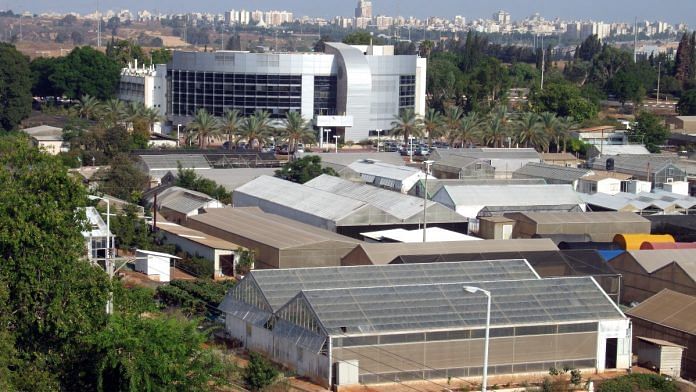Tel Aviv: Indian post-doctoral fellows involved in high-profile agritech research at a centre in Israel complain that there aren’t enough job opportunities back home, with some going so far as to say that Indian institutes have a “bias” against them.
Israel is home to around 900 Indian students and research scholars, a majority of whom are pursuing doctoral and post-doctoral studies. One of the best-known institutes in Tel Aviv, the Agricultural Research Organization (ARO), Volcani Center — which comes under Israel’s Ministry of Agriculture and Rural Development — is home to nearly 60 Indian post-doctoral fellows.
The fellowships last between three months and two years, but many Indians stay on beyond the two-year mark by either extending their contracts or searching for external funding.
Many are keen to return to India and spread the technological knowledge gained abroad, but claim they don’t get selected for positions in institutes under the Council of Scientific & Industrial Research (CSIR), the Indian Council of Medical Research (ICMR), or the Indian Council of Agricultural Research (ICAR).
However, Enna Dogra Gupta, who works under the Division of Policy and Communication at ICMR, told ThePrint that there’s no bias against researchers applying from abroad. “This is not a phenomenon in India but all over the world. The number of academic positions is always low as compared to the applicants,” she said.
“The solution is that students need to be primed for careers other than academia, like publishing, R&D in industry, communications.”
ThePrint also contacted Purnima Rupal, senior scientist and media coordinator at CSIR, but she declined to comment.
Also Read: UGC’s new rules will plunge students into PhDs with no research experience, say wary academics
‘Recruitment policy needed for researchers trained abroad’
Speaking to ThePrint, ARO postdoctoral fellow Sudeep Tiwari, 36, said Indian institutes should have a robust system to recruit researchers like him.
“Indian medical and research institutes should recruit 20-25 per cent of their students from out of the country but they are not doing this. Only a few like BHU (Banaras Hindu University) have an explicit 25 per cent intake of post-doctoral fellows from abroad, but there have been no openings for the last two years.”
Tiwari joined the ARO fellowship in March 2019, after completing his PhD in Environmental Biology from APS University, Madhya Pradesh jointly with CSIR-Central Institute of Medicinal and Aromatic Plants (CIMAP).
He extended his contract at ARO after many failed application attempts to Indian institutes like CSIR-National Environmental Engineering Research Institute (NEERI), CSIR–National Botanical Research Institute (NBRI) and the Institute of Bioresources and Sustainable Development (IBSD).
He is now considering a job offer from the University of Nebraska. “I would have loved to return to my own country but now I am forced to take up a job in the US because I have a family to support,” he said.
Also Read: 19% jump in Indian students studying in US in 2021-22, finds Open Doors report
‘Those with less experience get preference’
Animesha Rath, 34, an ARO postdoctoral fellow who comes from Odisha, is researching the two-spotted spider mite — a common pest for crops across the world.
She claimed that her research could help farmers in Rajasthan and Karnataka or horticulturalists in Kerala where the mite is a problem, but there aren’t enough jobs back home where she can impart this technological knowledge.
“I’ve seen the names of my former classmates who have only a PhD getting onto shortlists. They have less experience than fellows like me, and yet they are getting preference,” she told ThePrint, adding that she has applied five to six times to various Indian research institutes.
In May this year, Union Minister of Agriculture and Farmers Welfare Narendra Singh Tomar visited Israel, including Indian fellows at ARO. The researchers said they aired their concerns to the minister regarding the lack of jobs, and were assured of a speedy solution.
(The reporter was part of a media delegation to Israel hosted by the Israel embassy)
(Edited by Theres Sudeep)
Also Read: Meetings in Abu Dhabi, studying infra in Tanzania — IITs gear up for offshore campuses by 2023



